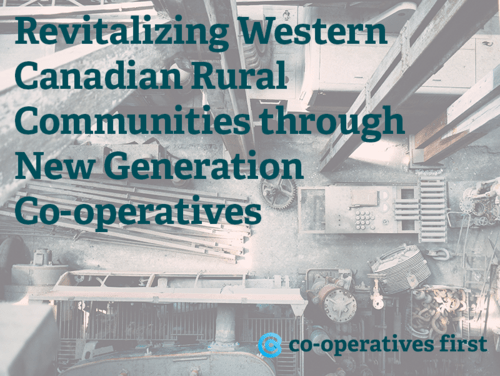Travelling across farming communities in western Canada, we experience three distinct recurring themes:
1. Not enough well-paying jobs in rural communities
2. Young people can’t build a family life in the area (often because of #1)
3. The need to add more value locally to raw products (which would increase #1 and allow opportunities for #2)
Sometimes you gotta do it yourself.
For the most part, government and big business are the driving forces behind the primary industry necessary for addressing these three challenges. But there are options that allow communities to take things into their own hands – one of these is the DIY method western Canadian farmers and ranchers are famous for: co-operatives.
For rural markets facing challenges attracting primary business or the uncertainty of government policy choices, there is a co-operative business solution that can help rural communities overcome the above three challenges: New Generation Co-operatives.
Introducing new generation co-operatives
New generation co-operatives allow farmers and ranchers to invest in a downstream value add business that purchases their commodities at fair market value, keeps the investment in the community and increases the purchase value – potentially providing dividends on top of a guaranteed purchase.
Investing in a business like this brings numerous benefits. First there’s the direct impacts of adding value to the commodity, introducing opportunity for targeting new markets and creating well-paying local jobs that appeal to a new generation of workers.
But new generation co-operatives also have indirect benefits of secondary industry growth in business development and jobs, a stronger argument for infrastructure investment from government and big business, and the attraction of competitors or other primary industry players. All of which is good for the community.
High entry price, but the rewards are multiple
Shares in new generation co-ops usually cost more than other co-ops as the investment by shareholders provides the foundational financial capital supporting the new enterprise.
The trade-off for the shareholder producers is an increased certainty stock will be purchased at a fair market price and the potential for dividends from profits. Plus, the investment stays local, creates new jobs and adds value to the commodity before leaving the region.
And it works.
The new generation co-op model has seen a lot of success in the American mid-west. One example is the North American Bison Co-operative (NABC), which operates under the trademark, TenderBison.
NABC owns a bison processing facility that markets shelf-ready bison products to retail and institutional customers across the country. Bison ranchers purchase lifetime shares issued by the co-operative business, and the business purchases a bison per share per year from shareholders. Being a shareholder also entitles investors to similar benefits afforded shareholders in other co-operative businesses, including a vote on important decisions and share in profits.
Investment in this business benefits shareholders directly in two ways: stock has a guaranteed, fair price buyer and a dividend return if the business turns a profit.
Managing share supply to market demand is an ongoing challenge for NABC, and they’ve expanded into the natural beef market to ensure production capacities, but they still make a priority of “sustaining the future of the family rancher” and have over 330 independent ranchers as members.
New generation co-ops in Canada…
Following the success of new generation co-ops in the American mid-west, the four western Canadian provinces adopted legislation specifically targeting this model.
Despite this legislation being around for almost 2 decades, there have been relatively few new generation co-ops formed in western Canada, and it’s an under explored opportunity for many rural communities. But there are a few notiable exceptions. One is Westlock Terminals in Westlock, Alberta.
Alberta’s new generation co-ops
A group of farmers raised the capital to purchase grain elevators in Westlock, AB. The terminal buys the investing shareholders’ grain, has created local, well-paying jobs and helped retain vital infrastructure in the community. Plus, the shareholders have a competitive advantage in processing and marketing identity preserved grains.
The Westlock area has benefitted from the new generation co-operative model. We know other communities could as well.
If you’re interested in learning more about new generation co-ops, contact us.
Curious about the provincial regulations in your province?

 Written by
Written by 


